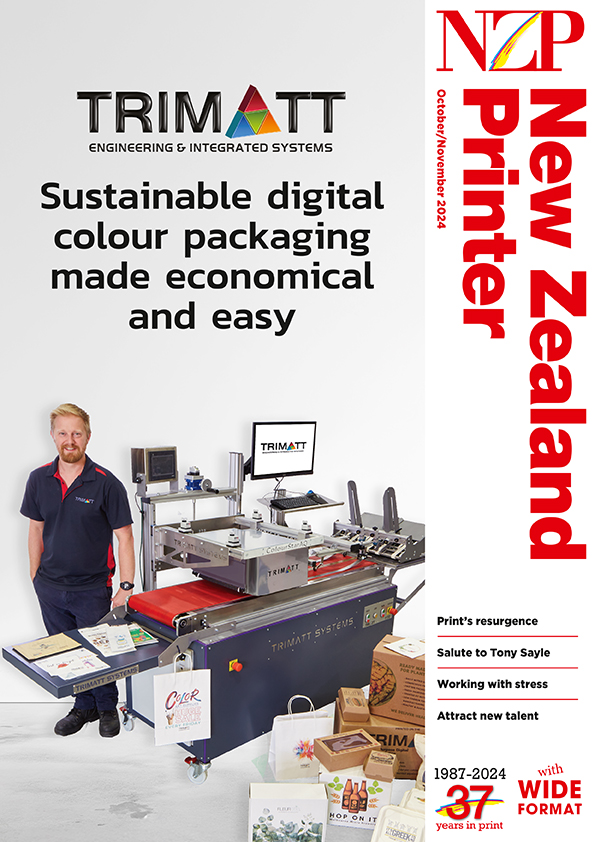David Taylor, general manager of New Zealand’s Ryobi supplier, Cyber says, “Our factory in Hiroshima was not affected so everything seems to be okay for Ryobi in terms of operations. Our head office in Tokyo is also still open however it is running on a skeleton staff as many of our people are unable to get to the office due to the lack of transport. It shouldn’t have an impact on our New Zealand customers.”
Komori avoided major interruptions, although its Yamagata facility received minor damage from the quake. Ian Gillanders, general manager machinery at Komori’s New Zealand supplier Ferrostaal says, “As far as we know there has been a limited amount of damage, nothing major. It shouldn’t affect us other than there might be some delays owing to the fact that they have had major disruptions with power and Komori staff will be assisting the Japanese industry and community in coming days.”
Rhus Daube, managing director of Print Supplies & Machinery, the New Zealand supplier of Sakurai presses, says, “It should be business as usual for New Zealand. The Sakurai plants haven’t suffered any damage and it appears that the workers and families are safe. Of concern is the state of the nuclear reactors and we’ve been monitoring that quite closely.”
Troy Wood, business manager for AM International, New Zealand supplier of both Horizon and Shinohara equipment says those companies’ are away from the danger zone. He says, “Horizon is down by Kyoto and Shinohara is quite inland so they weren’t affected. However Bernie Robinson, managing director of Currie Group and Andrew Matthews of Currie Group are there right now.”
Robinson, contact by i-grafix, painted a chaotic picture of the aftermath. He said, “It’s all a bit scary, the trains have stopped due to power issues so we have to get taxi’s everywhere. People are just as concerned and scared as we are, but we are all still in good spirits.”
Ricoh has already donated 300m yen to the immediate relief that will involve Red Cross. The company has a number of plants with some affected by the earthquake. Murray Clark, marketing manager Ricoh New Zealand, advises that it’s too early to make a definite statement. He says, “It’s still very much in a state of flux. So far we have no news of injuries to Ricoh employees but there may be people missing that we aren’t aware of. The buildings that have suffered damage will need assessing so we can’t say how any production schedules will be affected. It will be similar to Christchurch in that everyone will want to move things in and out of there but they won’t be able to do that for a while. Infrastructure is a big issue though the affected area may not be a hugely industrial area.”
Canon reported a number of injuries as well as power outages, damage to buildings and stoppages in production equipment at several sites. The company reported 15 injuries at its Utsunomiya Office in northern Honshu, however none of these, were life-threatening. The earthquake also had a slight impact on Canon offices, plants and Group companies in the western half of Honshu, however there was no significant damage to buildings or equipment.
Canon appears to have contingency plans for ingoing production if damage proves serious, a company statement says, “In the event that production operations may be suspended for a month or more, Canon will consider making use of alternate sites that were not damaged by the earthquake as a means of continuing production. Canon continues working to ascertain damages and determine when operations can resume.”
Epson appears to be one of the hardest hit with the company suffering damage to its Sakata Plant and also to Group companies in the Tohoku areas, however no casualties have been reported at this stage. An Epson facility in Hachinohe, Aomori Prefecture was subjected to a tsunami of approximately one metre with operations being suspended.
The company’s operations in the Akita and Yamagata prefectures have also been suspended due to power cuts caused by the earthquake. Epson’s Fukushima Plant also sustained earthquake damage, with the company temporarily terminating operations as the plant is
approximately 16 km from the Tokyo Electric Power Company’s Fukushima No. 1 nuclear power station, and therefore within the evacuation area.
Meanwhile, Konica Minolta Japan employees were forced to stay overnight at the company’s offices on Friday night due to the temporary stop of the subway. Josh Byers, national marketing manager Konica Minolta new Zealand says, “The head office and the main business operations of Konica Minolta have been unaffected from the devastating earthquake and tsunami which is good news from a business perspective – as there should be no disruptions to product supply for New Zealand.
“Konica Minolta Business Technologies are however dealing with is the loss of one of their local sales branches in the affected area – which they have lost contact with. They are obviously extremely worried about the impact on their local staff in that area – but are still working to try and find out what has happened to the people from that branch. Konica Minolta New Zealand’s thoughts are with our Japanese colleagues at this time and with everyone who has been affected by this terrible disaster.”
Fujifilm’s Tokyo liaison reported that none of its offices have been damaged at this time. A statement from Fujifilm outlines, “Production has not experienced any notable impact, apart from one or two minor interruptions due to transport and road infrastructure damage. But the majority of Fujifilm’s workforce is able to get to the office at this point.”
Screen’s nine facilities south of Tokyo also avoided damage with the company reporting its operations are continuing. The company will be sending a service team north within the next few days to assist its affected customers.
Roland DG and Kip representatives were unavailable for comment at the time of publication.

